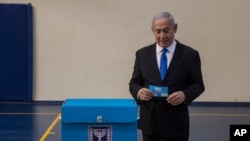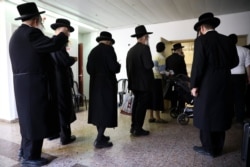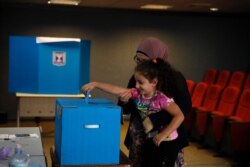Israelis are voting Tuesday in general elections for the second time in six months as Prime Minister Benjamin Netanyahu faces a challenge from former military chief Benny Gantz.
The second election was called after Netanyahu was unable to put together a majority coalition of at least 61 seats in the 120-seat Knesset following April’s election.
Israel traditionally has a high voter turnout of 65% to 70%. There were concerns that in this second election turnout might drop, but that does not seem to have happened. As of 2 p.m., voter turnout was 36.5%, slightly more than last time among Israeli Jews.
The election is a referendum on Netanyahu, who recently surpassed Israel’s first Prime Minister David Ben Gurion, as Israel’s longest-serving leader. Netanyahu has led Israel for the past decade but faces several corruption allegations that could force him to resign. He maintains that he is innocent of all charges.
All of the candidates have campaigned hard for their parties. Netanyahu’s rightist Likud and the centrist Blue and White led by former chief of staff Gantz are expected to win the largest number of seats, but will need other parties, including the ultra-Orthodox and the more hard-line right, to form a coalition. Last time Netanyahu came close, getting a total of 60 Knesset members to support him, but fell one short of the needed majority.
According to Israeli election rules, no election campaign activity is allowed just before or on Election Day. However, visitors to Netanyahu’s Facebook page on Election Day found polling information there, in violation of the law. Facebook suspended Netanyahu’s Facebook chatbot for the remainder of the day.
Last week, the chatbot was also suspended after it warned of a possible “secular left-wing weak government that relies on Arabs who want to destroy us all — women, children and men.” Netanyahu insisted he did not write that message.
On the streets of Jerusalem, activists from different political parties accosted voters on the way to the polls, trying to convince the undecided. Many voters said they were undecided up until the last minute.
“My husband voted Bibi because he’s crazy about him,” said personal trainer Adina Yisacharoff, using Netanyahu’s nickname. “Somehow, as my hand was reaching for Yamina [the hard-line party of former Justice Minister Ayelet Shaked], it somehow ended up putting a Likud vote in the envelope. So, I guess I am a Bibi girl after all.”
Others said their first priority was to get rid of Netanyahu as prime minister.
“I’ve had enough of Netanyahu being prime minister,” said Noa Binnes, a chemistry student. “He’s suspected in several corruption cases, and I think he’s becoming more and more extreme. I think he is deliberately weakening possible future leaders to make sure he remains in power.”
While voting rates among Israeli Jews were consistent with the last election, Arab Knesset members said voting rates among Arab citizens of Israel were low. This, despite the fact that four Arab parties joined together in one party called the Joint List.
“We must do more to increase the voter turnout in our areas,” Ahmed Tibi, a longtime Arab Knesset member, said in a campaign video sent out to activists. “All of the reports by Prime Minister Netanyahu about an increase and long lines are simply not true.”
A large Arab turnout would make it harder for Netanyahu to get to the magic number of 61 seats for a majority.
Netanyahu has said that if he wins another term, he will annex the Jordan Valley, about 30% of the West Bank, as well as the Jewish settlement of Hebron. Palestinians say that would make a future two-state solution of a Palestinian state next to Israel impossible.
Netanyahu's critics worry that he would also push through legislation to give himself immunity in the face of all of the corruption charges against him.







